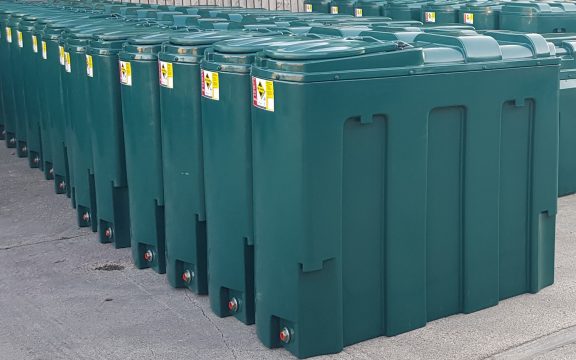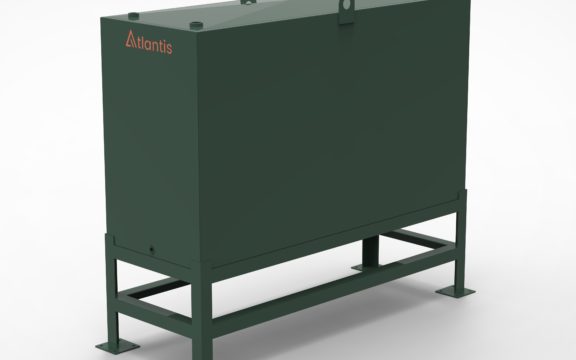FAQs About HVO Fuel Tanks
1 What size HVO fuel tank do I need?
Determining the ideal HVO fuel tank size relies on several factors, including your average usage, the space you have available and how often you intend to fill the tank. Of course, less refill time means less downtime for your business, so it’s important to maximise rather than minimise when considering what size is suitable. HVO stores better and for longer than many traditional fuels, which means that larger tanks that might have been out of the question previously are now an option.
Our fuel storage tanks come in a huge range of capacities, from smaller tanks for backup power to larger ones for continuous usage. We can even design and manufacture you a bespoke tank to meet your needs directly, no matter how unique they are. Consulting our experts can help pinpoint the perfect tank size to match your operational requirements and potential needs in the future.
2 What are the HVO fuel storage regulations?
HVO is a biodegradable and non-toxic substance. However, although it’s safer to store than mineral diesel or kerosene, the regulations for storage are the same as for other fuel oils.
If you’re storing oil in the UK (including mineral diesel, biodiesel, kerosene and blends) in a container with a capacity of over 200 litres, you must follow oil storage regulations. This is to ensure the safety of users, livestock and the environment. These regulations encompass tank construction, bunding requirements and environmental considerations.
The tank must feature a secondary containment system (bund) to store at least 110% of the main tank’s contents. This is to capture any leaks and prevent contamination
Even if your tank holds less than 200 litres, it will still require a bund:
- Where oil spills can easily run over the ground to reach waterways or a drinking water source
- If the tank is within 10 metres of waterways, coastal or fresh, or other bodies of water
- Within 50 metres of a drinking water source
- Where oil spills can run into an open drain
- Where oil spills could run into a manhole cover
- Where the vent pipes can’t be seen as the tank is filled
- Inside a groundwater protection zone 1
We would always recommend that you check these regulations with your local authority as there are some variations across different regions. Regulations are also subject to change.
Atlantis Tanks’ HVO fuel storage tanks are manufactured to comply with all the relevant regulations. Even if you require a storage tank with a capacity of less than 200 litres, we’d always recommend a bunded tank – oil spills are a headache that you can do without!
3 How do I maintain my HVO fuel tank?
Maintaining your HVO fuel tank is crucial for peak performance and durability. Regular inspections for leaks, corrosion or other structural problems are essential.
Always ensure the tank remains clean and free from debris and that it is easily accessible for visual inspection all the way around – don’t stack things up behind it! Atlantis Tanks can provide guidance on maintenance checks for your HVO storage tanks.
We’d also recommend scheduling your tank checks for the warmer months as it makes it a far less unpleasant task!
4 Can I convert my existing tank for HVO fuel storage?
Converting an existing tank for HVO fuel storage is feasible in many cases. HVO blends with other fuel types so there is no need to ensure that the tank is completely empty before refilling. However, it’s crucial to ensure the tank meets the necessary standards and is compatible with storing HVO fuel safely. Consulting Atlantis Tanks’ experts for an assessment and guidance on possible modifications is recommended.
5 What are the best practices for long-term HVO fuel storage?
One of the benefits of switching to HVO is that it maintains its quality far longer than mineral diesel: you can store it for up to 10 years. However, long-term HVO fuel storage requires proper maintenance of thanks and adherence to specific guidelines. Implementing routine checks, maintaining correct temperatures and ensuring tanks are clean and free from contaminants are critical. Atlantis Tanks can advise you further on best practices for prolonged HVO fuel storage.
6 What safety measures are recommended for handling HVO Fuel?
HVO is a relatively safe and non-toxic product. But, handling HVO fuel still requires adherence to safety protocols. Ensuring proper ventilation and using appropriate protective gear important to ensuring the safety of workers and for preventing damage caused by spills and leaks.
Atlantis Tanks’ commitment to finding solutions for your HVO storage needs
All Atlantis Tanks fuel storage solutions are designed and constructed to ensure compliant storage of HVO fuel. Our tanks adhere to industry standards and regulations, so you can enjoy peace of mind that they are reliable, safe and secure.
We provide HVO dispensers as well as both plastic diesel tanks and steel diesel storage tanks that are also designed to be suitable for HVO. We also stock a range of portable fuel tanks for getting your HVO to where it’s needed quickly and safely.
Contact our experts for guidance
For any further information about HVO or suitable HVO storage tanks, Atlantis Tanks’ expert team is here to help. With a wealth of knowledge and experience, our specialists can provide tailored advice, ensuring your transition to HVO fuel storage is seamless and meets your specific operational needs.
Don’t hesitate to reach out for comprehensive guidance on HVO fuel or selecting the right storage solution. Call 0330 999 1100 or email [email protected]






